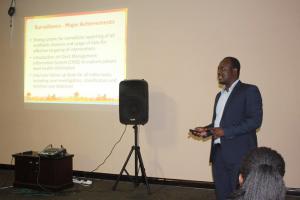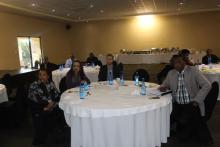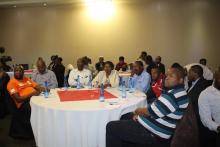Malaria elimination by 2020 is possible in Swaziland
06 June 2017 - The Kingdom of Swaziland is among 21 countries globally with the potential to interrupt indigenous malaria transmission by 2020 thereby achieving the goal of malaria elimination. Following a mid-term review process of the National Malaria Elimination Strategy 2015-2020, concluded recently, the country was found to be in a historical position to be a pioneer in malaria elimination in Sub Saharan Africa. The country has made great progress in reducing the incidence of malaria.
The objectives of the comprehensive review process were to assess: the progress of the national malaria programme towards the epidemiological and entomological impact targets; level of financing of the programme; capacity of the national malaria programme to implement planned activities; attainment of programme outcomes and define the programming implications of the lessons learnt in the implementation of the strategic plan as well as make recommendations for enhanced impact. The process involved an internal desk review and external validation. The review followed the national programme thematic areas; programme management, surveillance, case management, vector control and health promotion.
Malaria elimination is included and prioritised in the national health agenda as evidenced by the availability of domestic financing in addition to technical and financial support from partners including the World Health Organization (WHO). There is also political commitment at the highest level as His Majesty, King Mswati III, is the chairperson of the African Leaders Malaria Alliance (ALMA) for the next two years. The programme also has adequate and appropriate human resources.
Malaria is a notifiable disease in Swaziland hence all confirmed cases are reported through the Immediate Disease Notification System (IDNS). This is a strong system for immediate reporting of all notifiable diseases. The notification triggers intensive follow up done for all index cases, including case investigation, classification and reactive case detection. The main vector control intervention is targeted Indoor Residual Spraying (IRS) supplemented by long Lasting Insecticide treated Nets (LLINs).There is a good reporting system for spray activities feeding into database for IRS planning. These interventions are complimented by an innovative home improvement project where eaves of all houses in identified high risk areas are screened to prevent mosquito entry.
Health workers are regularly trained on malaria diagnosis and case management. All malaria cases are parasitologically confirmed before treatment with Artemisinin Based Combination Therapy according to national treatment guidelines. Malaria diagnosis and treatment is free of charge in both public and private health facilities. Antimalarial drugs and laboratory commodities are available in all facilities and the country has rolled out a Laboratory Information Management System for commodity tracking.
There have been intensive mass media campaigns (radio, television, print and billboards); border campaigns targeting travelers as well as community engagement and social mobilisation. Community based Malaria Elimination Committees (MECs) were established in localities with active foci for enhancing community participation and ownership of malaria elimination interventions.
For enhancing the impact of the strategic plan implementation a number of recommendations were made. It was recommended that all cases be investigated within 48 hours including those notified during weekends. There is need to train personnel to carry out vector control linked to case investigation and routine vector surveillance as well as establish sentinel vector surveillance sites including insecticide resistance monitoring. Vector control guidelines should be revised in line with the requirements of elimination and the programme should implement IRS quality monitoring after every spray round. The supply chain system especially the distribution of malaria commodities needs strengthening as well as the training programme for malaria case management, microscopy as well as malaria diagnosis Quality Assurance (QA) programme. There is need to design and implement community engagement and social mobilisation activities across other programme thematic areas and public health programmes. The use of innovating communication channels was identified as necessary as well as enhancing community ownership of the elimination agenda.
The findings of the review were shared with the Senior Management Team in the Ministry of Health and wider stakeholders who endorsed them. During the dissemination meeting the WHO country representative, Dr Tigest Ketsela Mengestu thanked the team for the good work done and coming up with very sound recommendations. She urged the programme to consider the recommendation in revising the strategic plan. She reiterated that WHO will continue to work with all stakeholder in supporting the country to achieve malaria elimination by 2020.
The review process was conducted by an internal team made up of programme staff, members of the Swaziland Malaria Elimination Advisory Group (SMEAG) thematic sub-committees and the various departments of the Ministry of Health. The external review team comprised of Dr Birkinesh Ameneshewa (WHO/AFRO), Dr Kharchi Tfeil (WHO IST – West Africa), Dr Kevin Makadzange (WHO Swaziland), Mr Anderson Chinorumba (WHO/ IST/ESA), Prof Rajendra Maharaj (Medical Research Council-South Africa), Prof. Immo Kleinschmidt (Elimination 8 and London School of Tropical Medicine and Hygiene), Mr Bradley Didier (Clinton Health Access Initiative) and Ms Nyasatu Ntshalintshali (Clinton Health Access Initiative). The World Health Organization provided technical and financial support towards the review process.
For more information contact :
Dr Kevin Makadzange– HPR officer ; World Health Organization—Swaziland Country Office, P.O. Box 903, 2nd Floor, Lilunga House, Somhlolo Road, Mbabane, Swaziland. Phone : (+268) 24042928, 24049635, fax : (+268) 2404 4566 email: makadzangek [at] who.int (makadzangek[at]who[dot]int)
Below :
01 - One of the external reviewers from IST Mr Anderson Chinorumba delivering findings of the review during a meeting at Happy Valley Hotel.
02 - WR Swaziland Dr Tigest Ketsela Mengestu and Ministry of Health Under Secretary Simon Kunene (right) among other dignitaries during the Malaria review meeting at Happy Valley Hotel.
03 - Stakeholders listening to presentations during the malaria review debrief meeting at Happy Valley Hotel






